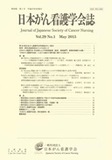Japanese
English
- 販売していません
- Abstract 文献概要
- 参考文献 Reference
- サイト内被引用 Cited by
要旨
目的:本研究の目的は,終末期がん患者の在宅療養継続の障害となる事柄についての訪問看護師の認識を明らかにすることである.
方法:関東に設置され24時間対応している訪問看護ステーションに常勤として所属する訪問看護師を対象に質問紙調査を実施し,90項目12ドメインの終末期がん患者の在宅療養継続の障害となる項目について,それぞれの項目を障害と考える割合を算出する.
結果:障害となると回答した割合が多かったのは,医師・ケアマネジャーの終末期がん患者の在宅療養への理解が不十分であること・訪問看護システムの不備があること・患者と家族に経済的負担があることなどであった.
考察:本研究の結果から,終末期がん患者の在宅療養を継続するためには,医師・ケアマネジャー・訪問看護師が終末期がん患者の在宅療養の特徴を理解し症状緩和の知識・技術を高め,訪問看護師が特に医師とケアマネジャーとの連携に留意し,患者と家族の経済的負担を軽減することが重要であることが明らかになった.
Purpose : The purpose of this study was to clarify visiting nurses' awareness of obstacles to continued home care for terminal cancer patients.
Method : Questionnaires on the 90 potential obstacles grouped into 12 domains were conducted for full-time visiting nurses who worked for 24-hour home nursing stations in the Kanto region, and the percentage of nurses who recognized each of the potential obstacles to be an actual obstacle was calculated.
Result : Obstacles identified as actual obstacles by high percentages of the nurses included a lack of understanding of home care for terminal cancer patients by physicians and care managers, problems in the home nursing systems, and the financial burden on patients and their families. The results of the study indicated that the following were important for continued home care for terminal cancer patients.
Discussion : Physicians, care managers, and visiting nurses must understand the characteristics of home care for terminal cancer patients and improve knowledge and skills in alleviating symptoms. Moreover,visiting nurses must coordinate closely with physicians and care managers. The financial burden on patients and their families must be eased.
Copyright © 2015, Japanese Society of Cancer Nursing All rights reserved.


